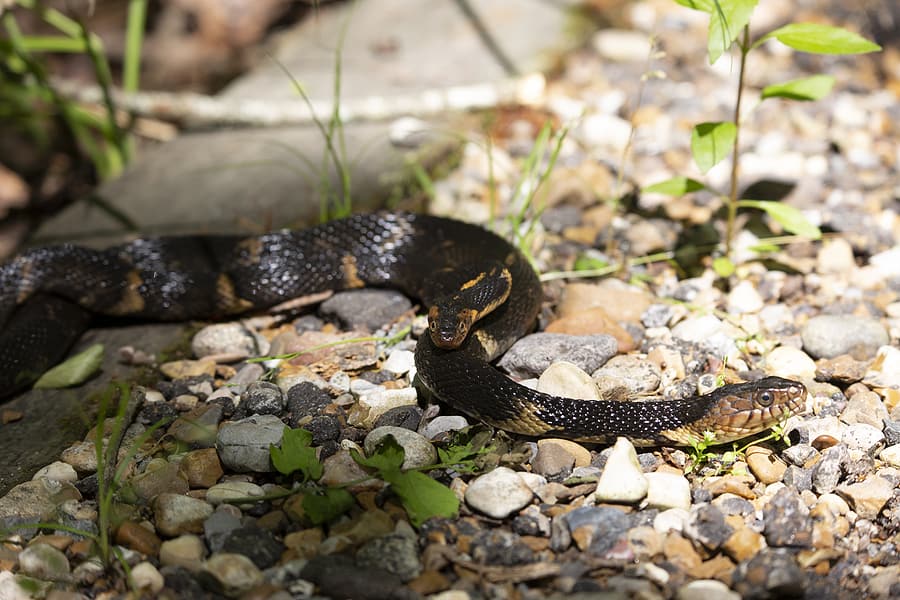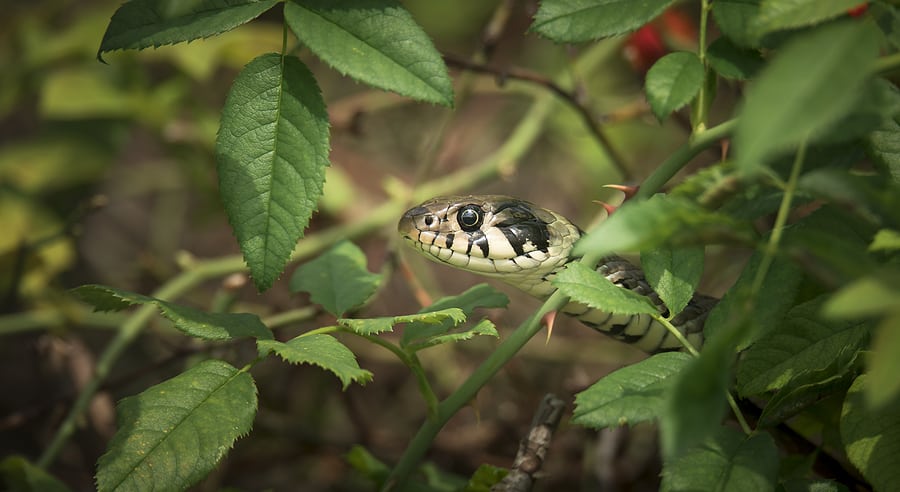READY TO GET STARTED?
REQUEST A FREE ESTIMATE
Fill out the form below or call (888) 466-7849 for a free, no-obligation estimate.

As the weather warms up, snakes will begin to emerge from brumation (a state of deep sleep that reptiles and amphibians enter during periods of cold weather). Although it can be scary encountering a snake in your yard or in your home, the majority of them mean you no harm. In fact, most don’t want anything to do with humans at all! Most North American snakes are harmless and, in fact, there are only 5 venomous snakes in the state of Georgia.
The first step in preventing snakes is to figure out what is attracting them to your yard and home in the first place. Snakes will typically come around in search of either food or shelter. By eliminating these attractants, snakes will be less likely to hang around your personal space.
Snakes will often come around in search of a place to hide out from predators or to lie in wait for their own prey. Try to avoid debris and rock piles in your yard. Don’t pile rocks up in your landscaping or let other debris accumulate in your yard. Snakes will also use tall grass to hide in so keep grass mowed short and mow it frequently. Mulch attracts both snakes and their food sources. Try to use less mulch or use another type of ground cover if possible. Store firewood away from your home and elevate it if possible as snakes will hide in the cracks and crevices.
Snakes will primarily come around looking for or chasing food. Snakes are known to feed on rodents, birds, insects, and amphibians so eliminating these pests from your home and yard will also help keep snakes away. Excessive moisture attracts all of these food sources so try to avoid overwatering your lawn and getting rid of any standing water. Pick up fallen fruit as rodents and other pests love to eat them. The same goes for spilled birdseed from birdfeeders. Feed pets indoors if possible and, if not, don’t leave pet food out overnight. Keep trashcans clean and seal them tightly. Keep garages clean and clutter free. Inside, keep kitchens and other food areas clean.
Snakes will use a variety of methods to get into your home, garage, attic, or basement. Routinely inspect the exterior of your home and try to identify any potential entry points. Seal any cracks around your foundations, walkways, and porches. Consider installing fencing made of rigid mesh that is at least 2 feet tall and buried 4″ to 6″ into the ground. You can also attach aluminum flashing to the outside bottom portion of the fencing. Make sure the screens on your doors and windows are tightly sealed and in good repair. Use galvanized screens to cover your vents and drains. Close up cellar doors, broken gutters, pet doors, unsealed basement windows, open crawlspaces, and holes in your roof or siding. Keep tree branches trimmed back away from your home. Use gravel or other uneven ground cover as snakes cannot move or hide as easily on these.
When snakes are spotted around your home your first instinct is usually to either run away or get rid of it. While they can be disturbing, most snakes are actually beneficial to have around – eating other pests and keeping their populations under control. If you have an issue with snakes, contact your local pest control company who can help identify what type of snake you are dealing with and help catch and relocate it safely and humanely.
Controlling Millipedes In and Around Your Home
How To Keep Wildlife Out of Your Yard

Snake season in Georgia starts in spring and runs through late fall. As the temperatures start to warm up, snake activity in our area will increase. As snakes emerge from hibernation, they will go in search of one thing: FOOD! This quest will often lead them into our backyards, gardens, and even local parks. With snake season just around the corner, now is the time to take action. Here are some snake prevention tips to help you prepare for snake season.
Snakes will use anything they can find for cover. Take the time now to clean up leaf litter, fallen logs, piles of bricks and rocks or anything else snakes can use as a hiding spot. If you can’t remove them, try to elevate them off the ground. Keep your lawn and any other surrounding areas with grass mowed short. Snakes will use tall grass as cover. Low hanging growth from trees, shrubs, hedges, etc. provide natural places for snakes to climb and hide. Keep them trimmed back from your home and off the ground. Discard any mulch or grass clippings away from your property as snakes will burrow into these for a sheltered hiding space.
Snakes will use holes in the exterior of your home to gain access inside. Carefully inspect the outside of your house for holes, making sure to check under roofs, under the house, in skirting, on garages, etc. Repair or block any openings that you find.
Snakes will often go after hatchlings and bird eggs. If you have chickens, ducks or any other birds, make sure their pens or aviaries are kept tidy and in good repair.
Snakes will feed on rodents, frogs, and other insects. Keeping these pests away from your home will help keep snakes away, as well. Clean up spilled or uneaten birdseed from underneath feeders; keep outdoor trashcans sealed with tight lids; feed your pets indoors when possible; if you must feed outdoors, feed once or twice per day and bring food and water bowls indoors in between feedings; seal pet food and bird seed in plastic or metal containers with tight lids.
Moisture also attracts rodents, frogs, and other insects that snakes feed on. Eliminating moisture will help make your property less attractive to snakes. Eliminate any areas of standing water; fix leaky pipes and spigots; try to avoid overwatering your lawn; consider enclosing your crawlspace.
Establishing a routine pest control service helps prevent nuisance pest problems before they get out of hand. By keeping these pest populations under control, you decrease the risk of snakes by eliminating potential food sources.
Most snakes that are encountered are non-venomous; there are some venomous snakes in our area that you should be careful to avoid, however. If you must be outdoors during snake season, wear long pants, long sleeves, gloves, and closed toed shoes. If you go outside at night, take a flashlight, lantern, or torch. If you do encounter a snake, don’t go near it and don’t try to kill it. Stay calm, keep your pets and children away, and allow the snake to move away on its own. Back away slowly. If you choose to, contact your local wildlife control company who can come and properly identify the snake and safely relocate or eliminate it.
4 Reasons For A Yellow Lawn and How To Fix It